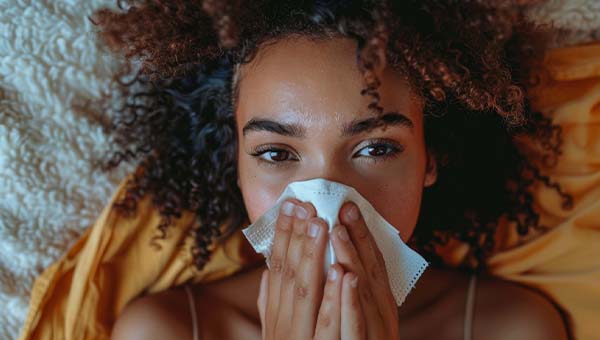Understanding the Common Cold: Causes, Symptoms, and Prevention
Sep 02, 2024
UNDERSTANDING THE COMMON COLD: CAUSES, SYMPTOMS, AND PREVENTION
As flu season approaches, it’s important to stay informed about the common cold and flu, how they differ, and what you can do to protect yourself and your loved ones.
What is the Flu?
The flu, short for influenza, is a contagious respiratory illness caused by influenza viruses. It can range from mild to severe, sometimes leading to hospitalization or even death, especially in vulnerable populations like the elderly, young children, or those with compromised immune systems.
How Does the Flu Spread?
The flu spreads primarily through droplets when an infected person coughs, sneezes, or talks. You can also catch the flu by touching a surface or object that has the flu virus on it and then touching your mouth, nose, or eyes. This makes public spaces like offices, schools, and public transportation high-risk areas during flu season.
Symptoms of the Flu
Flu symptoms can come on suddenly and may include:
- Fever and chills - A sudden high fever is one of the most common signs.
- Cough - A dry, persistent cough can last for weeks.
- Sore throat -Often accompanied by pain and discomfort.
- Runny or stuffy nose -Congestion is common, especially in children.
- Body aches and headaches -These can be severe and make it difficult to perform daily activities.
- Fatigue -Feeling extremely tired or weak, even after resting.
- Nausea and vomiting -These symptoms are more common in children than adults.
Prevention is Key
1. Get Vaccinated - The most effective way to prevent the flu is to get vaccinated every year. The flu vaccine is updated annually to protect against the most common strains.
2. Practice Good Hygiene -Wash your hands frequently with soap and water for at least 20 seconds. Use hand sanitiser if soap and water aren’t available.
3. Avoid Close Contact -Stay away from people who are sick, and if you are ill, stay home to prevent spreading the virus to others.
4. Disinfect Surfaces -Regularly clean and disinfect frequently touched objects and surfaces, such as doorknobs, light switches, and mobile phones.
5. Boost Your Immune System -Eating a balanced diet, exercising regularly, and getting plenty of sleep can help your immune system fight off infections.
6. Wear a Mask -In crowded places or during flu outbreaks, wearing a mask can reduce the risk of transmission.
Treating the Flu
If you catch the flu, early treatment can help reduce the severity of symptoms. Antiviral medications are most effective when taken within the first 48 hours of symptom onset. However, rest, hydration, and over-the-counter medications to relieve symptoms like fever and body aches are also important.
When to Seek Medical Attention
Most people with the flu recover within a few days to less than two weeks, but some may develop complications such as pneumonia. Seek medical attention if you or a loved one experiences difficulty breathing, chest pain, confusion, persistent vomiting, or symptoms that worsen or do not improve.
Conclusion
The flu is a serious illness, but by taking preventive measures, you can reduce your risk of infection. Stay informed, practice good hygiene, and get vaccinated to protect yourself and your community. At MedOrange Pharmacies, we offer flu vaccinations and a range of products to help you stay healthy during flu season. Visit us today to learn more!
Stay safe and stay healthy!
Recent Post

Bridging the Nutritional Gap: Understanding the Role and Limits of Supplements

Reclaim Your Focus: The Life-Changing Magic of a Digital Detox

Struggling with Dandruff? Simple Steps to Stop the Flakes!

Wellness Wednesday: Tips to Manage Your Health Better

Did You Know? Cloves Are Antioxidant Powerhouses Essential for Your Health!

Winter Wellness: Your Essential Guide to Thriving Not Just Surviving

Did You Know? Hibiscus Tea Can Help Tame High Blood Pressure

The Overthinking Trap: When Your Mind Becomes Your Worst Enemy

The Health Benefits of Journaling: A Simple Habit for a Healthier Mind and Body

A Beginner’s Guide to Intermittent Fasting



